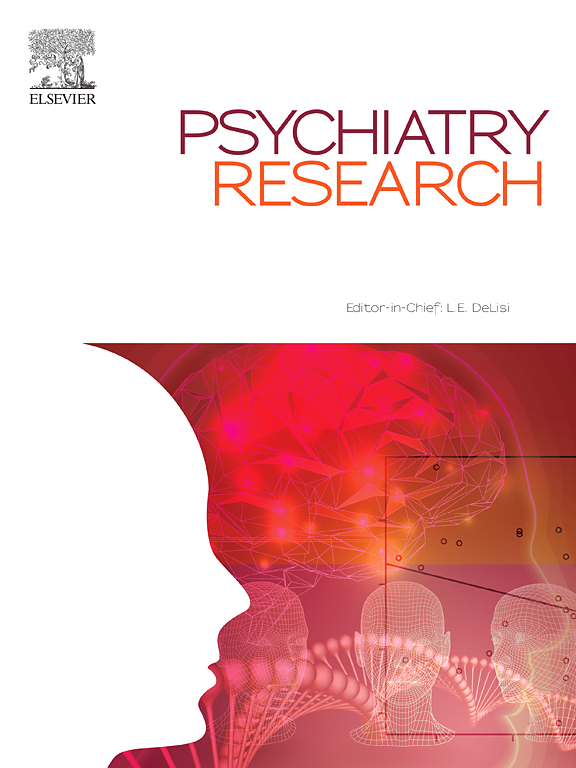The psychological consequences of the sedating side effects of antipsychotic medication: A systematic review
IF 4.2
2区 医学
Q1 PSYCHIATRY
引用次数: 0
Abstract
Background
Sedation is a common side effects of antipsychotic medication. It is poorly defined but is generally understood to encompass excessive daytime sleepiness, difficulty thinking or concentrating, and oversleeping. Sedation is often cited as impacting on functioning and wellbeing, however no review to date has assessed this relationship.
Aims of review
This review aims to explore the impact of the sedating side effects of antipsychotic medication on patient functioning and wellbeing.
Methods
Papers were identified by searching the databases PubMed, PsycINFO, EBSCO, CINAHL, and Clarivate Web of Science. A narrative synthesis and quality appraisal was conducted.
Results
Eleven peer reviewed papers met the eligibility criteria. Sedation was often identified as the most common side effect, but was not uniformly defined. Results consistently supported a negative effect of sedation on functioning (e.g. ability to perform day-to-day tasks and motivation). With respect to wellbeing, a negative impact of sedation was identified on quality of life and anhedonia, but less consistent interactions with other domains (e.g. anxiety), with few papers reporting on these links.
Conclusion
Despite the plausible impact of sedation on patients being widely discussed, there is surprisingly little empirical research in this area. The research that exists broadly supports a negative impact of sedation on functioning and wellbeing, although there are some complexities requiring further investigation, and many domains (e.g. interaction with mood) have not been substantively investigated. Sedation may be an important adverse side effect that is relevant to consider in improving recovery from psychosis.
抗精神病药物镇静副作用的心理后果:系统回顾
背景镇静是抗精神病药物的常见副作用。它的定义不明确,但通常被理解为包括白天过度嗜睡、思考或集中注意力困难以及睡过头。镇静通常被认为对功能和健康有影响,但迄今为止还没有研究评估过这种关系。本综述旨在探讨抗精神病药物的镇静副作用对患者功能和健康的影响。方法检索PubMed、PsycINFO、EBSCO、CINAHL、Clarivate Web of Science等数据库。进行了叙事综合和质量评价。结果6篇同行评议论文符合入选标准。镇静通常被认为是最常见的副作用,但没有统一的定义。结果一致支持镇静对功能(例如执行日常任务的能力和动力)的负面影响。在健康方面,镇静对生活质量和快感缺乏症有负面影响,但与其他领域(如焦虑)的相互作用不太一致,很少有论文报道这些联系。结论尽管镇静对患者的影响被广泛讨论,但令人惊讶的是,这一领域的实证研究很少。现有的研究广泛支持镇静对功能和健康的负面影响,尽管有一些复杂性需要进一步调查,并且许多领域(例如与情绪的相互作用)尚未进行实质性调查。镇静可能是一个重要的不良副作用,与改善精神病康复有关。
本文章由计算机程序翻译,如有差异,请以英文原文为准。
求助全文
约1分钟内获得全文
求助全文
来源期刊

Psychiatry Research
医学-精神病学
CiteScore
17.40
自引率
1.80%
发文量
527
审稿时长
57 days
期刊介绍:
Psychiatry Research offers swift publication of comprehensive research reports and reviews within the field of psychiatry.
The scope of the journal encompasses:
Biochemical, physiological, neuroanatomic, genetic, neurocognitive, and psychosocial determinants of psychiatric disorders.
Diagnostic assessments of psychiatric disorders.
Evaluations that pursue hypotheses about the cause or causes of psychiatric diseases.
Evaluations of pharmacologic and non-pharmacologic psychiatric treatments.
Basic neuroscience studies related to animal or neurochemical models for psychiatric disorders.
Methodological advances, such as instrumentation, clinical scales, and assays directly applicable to psychiatric research.
 求助内容:
求助内容: 应助结果提醒方式:
应助结果提醒方式:


